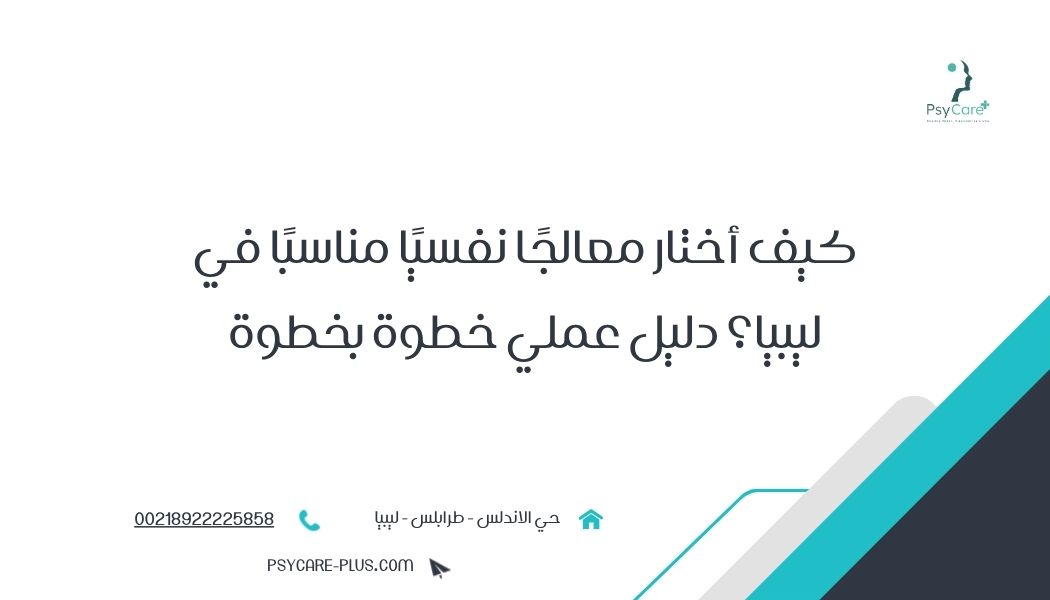How to Choose the Right Therapist in Libya: A Step-by-Step Practical Guide
Psychiatrist vs. Psychotherapist, Therapy Specialties, Privacy & Costs, and What to Expect in Session One

How to Choose the Right Therapist in Libya: A Step-by-Step Practical Guide
Note: Educational guide—not an emergency service. For immediate risk, contact local emergency services first. For structured care: Therapists — PyCare Plus on Google Play — Who We Are — Blog — Contact Us.
1) First decision: Psychiatrist or Psychotherapist?
-
Psychiatrist: a medical doctor who can prescribe medication and assess conditions that may need pharmacotherapy (severe depression, bipolar, psychosis, refractory insomnia, chronic high anxiety), in addition to psychotherapy if offered.
-
Psychotherapist: delivers evidence-based talk therapies (CBT, ERP, EMDR, ACT, Couples/Family, Child & Adolescent) without prescribing meds.
Rule of thumb: for mild–moderate anxiety/depression/PTSD/OCD, start with a psychotherapist; for higher severity/medication history, start with a psychiatrist or a combined team.
2) Define a clear therapy goal
Examples: “Reduce panic attacks by 70% in 8 weeks,” “Restore 7 hours of continuous sleep in a month,” “Stop daily OCD rituals.” Clear goals guide specialty choice and weekly tracking.
3) Match specialty to your needs
-
CBT for anxiety/depression/insomnia.
-
ERP for OCD.
-
EMDR/TF-CBT for trauma.
-
Couples & Family Therapy for communication and conflict.
-
Child & Adolescent services with family/school collaboration.
Helpful reads:
CBT for Anxiety: /blog/cbt-for-anxiety-libya
ERP for OCD: /blog/erp-for-ocd-libya
PTSD — When to Seek Help: /blog/ptsd-when-to-seek-help-libya
7-Night Sleep Plan: /blog/sleep-anxiety-habits-week
4) Cultural & personal fit
-
Language/dialect (Libyan Arabic/Standard Arabic/English).
-
Gender preference when discussing sensitive issues.
-
Religion/values: choose a clinician who respectfully integrates your practices if you wish.
-
Availability: mornings/evenings/weekends; session length.
5) Verifying credentials & experience
-
Licensure/credentials listed on the therapist’s card.
-
Years of practice and typical client groups.
-
Preferred problem areas (anxiety, OCD, depression, PTSD, couples, child).
-
Modalities used (CBT/ERP/EMDR/ACT).
Browse profiles here: Therapists with filters for specialty/gender/language/schedule.
6) Privacy & safety
-
Encrypted video/voice/chat sessions in-app.
-
No session recording by default.
-
Clear confidentiality limits (imminent risk to self/others).
More on privacy: Online therapy privacy /blog/online-therapy-privacy-libya
7) Costs & policies
-
Fees vary by experience/specialty/session length.
-
Cancellation/reschedule policy is transparent within the app.
Details: Therapy pricing in LYD /blog/pricing-therapy-lyd-libya
8) What to expect in session one
-
Structured assessment (symptoms/history/triggers/safety behaviors).
-
Measurable goals.
-
A short 2-week plan (skills + brief homework).
-
Follow-up agreement on initial session count and progress reviews.
9) Smart questions to ask
-
Which modality will you use for my case?
-
How will we measure progress weekly?
-
How many sessions do you expect initially?
-
Will there be home practice between sessions?
-
What’s your cancellation policy?
-
How do we protect privacy and data?
10) Red flags
-
Unrealistic promises of quick cures.
-
Unstructured assessment; no clear goals.
-
Pressure to share intense details before safety is built.
-
Ignoring core preferences (language, faith, boundaries).
11) Booking via PyCare Plus — simple steps
-
Download the app: PyCare Plus – Google Play
-
Create your account and set preferences (language/gender/specialty/times).
-
Browse therapists and read profiles/reviews.
-
Book the first session (intake).
-
Start the plan and track weekly progress inside the app.
FAQs
Do I need medication? Case-by-case with a psychiatrist.
Is online therapy effective? Yes—with clear plans and follow-ups.
When will I feel better? Many notice change within 2–4 weeks with consistent micro-homework.
Start now
-
Choose your therapist: Therapists
-
Download & book: PyCare Plus – Google Play
-
Learn our ethos: Who We Are
-
More guides: Blog
-
Questions? Contact Us
The “right fit” equals clear goals, the right modality, and respectful privacy. One small step today reshapes your recovery path.




